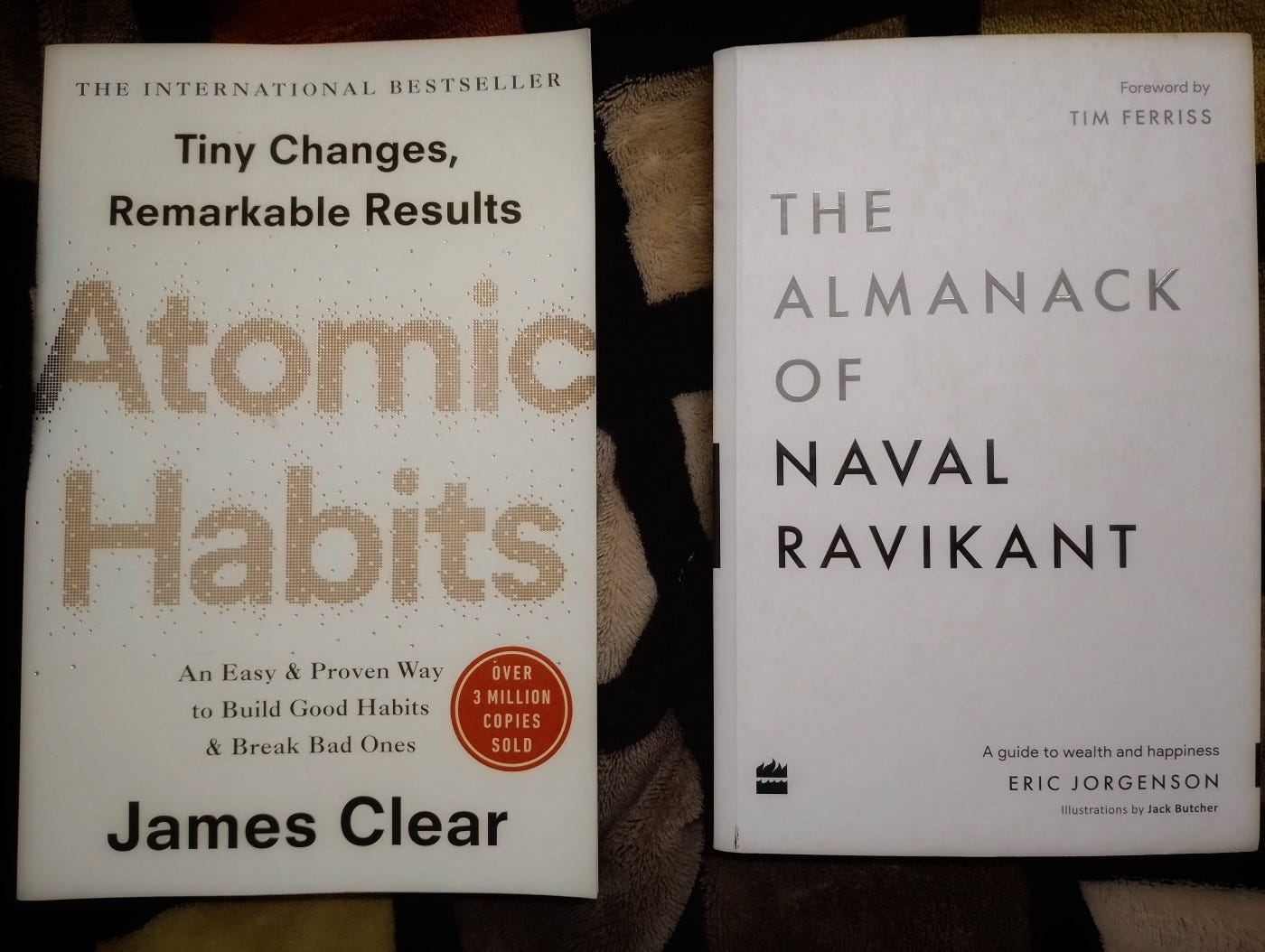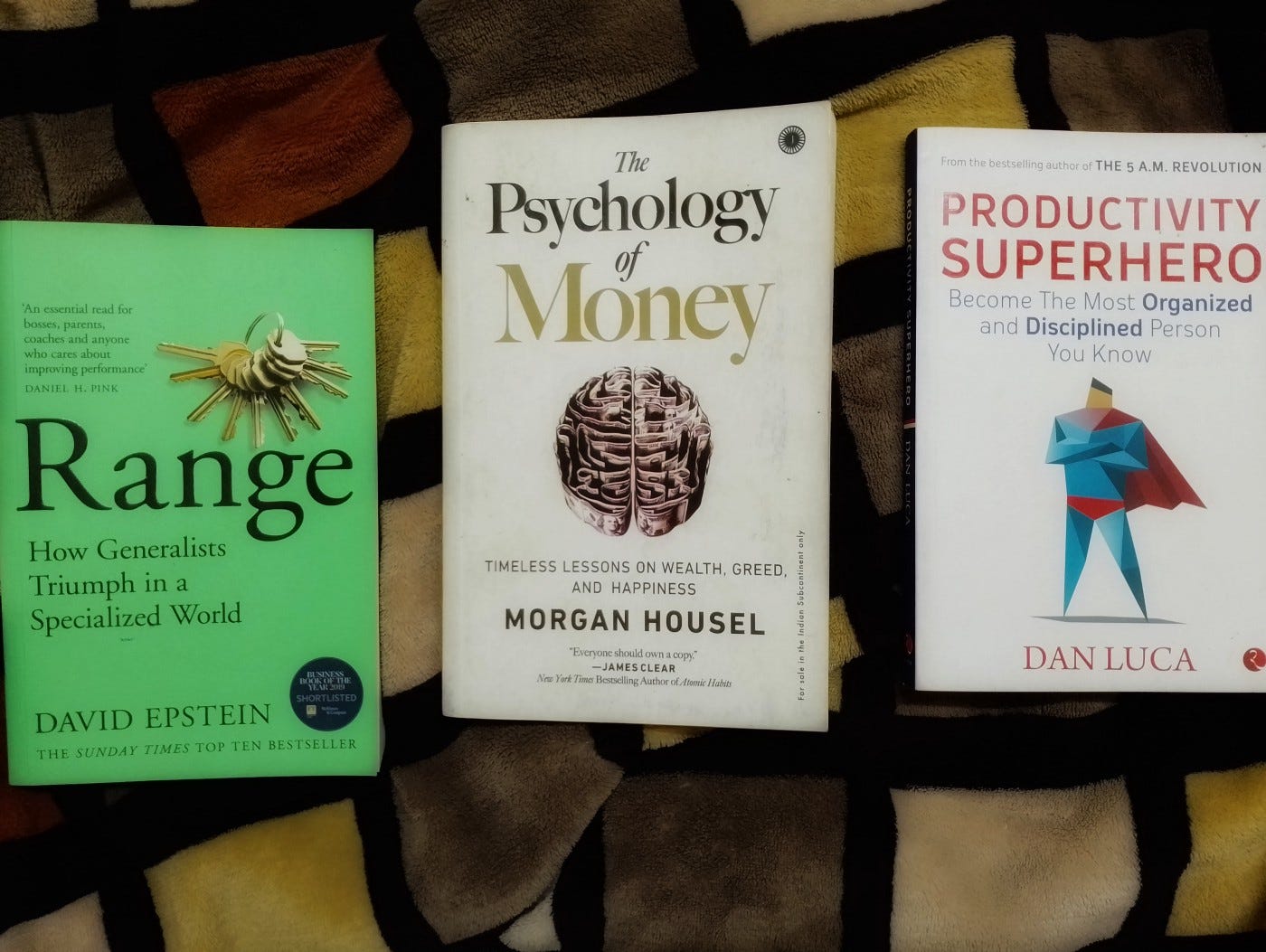5 Non-Fiction Books You Can't Miss as a Beginner
The books you choose in the beginning determine if you get interested in reading further. Pick up with care.

Welcome one and all to the Wednesday issue of Be Curious. I hope you are having a marvellous week thus far.
Today’s article is a reproduction of one of my Medium articles. The article I was planning to send to you guys today is still in draft form and needs quite a bit of work.
I doubt if I try to complete it, I will overwhelm myself and may encounter burnout unnecessarily. That’s why I will send it next Wednesday.
This week has been a little consuming for me:
I have pitched for a guest post in a Substack publication.
I have voluntarily submitted an article to be published on a SaaS startup’s website.
I am also writing an article to pitch to a science magazine because it’s special to me for some reasons.
And don’t forget about studies—I am a high schooler. (That’s why I have mad respect for people who write alongside their 9-5.)
I will be bringing a fresh set of stories to your inbox this Sunday. Until then, enjoy this book recs list :)
Much love,
Vritant
Books—waste of time?
Earlier, I used to believe that reading fiction was a waste of time. And I’d feel so good after finishing a non-fiction book. On contrary, finishing a fiction book would not match the level of enthusiasm.
But now that I’ve read quite a few books across all genres, I stand with the fact that first you should explore the width and then travel to the depth.
This famous line puts it well: “Know a little about a lot of things and a lot about few things.”
There’s no substitute for “going down the rabbit hole” but there’s also no substitute for “living a thousand lives.” Is there?
Though I have read a considerable number of fiction books, I still consider myself a novïce. It’s as if I’m just scratching the surface.
But with non-fiction, it’s quite the opposite. I’m like I know it all.
Let’s exploit that spirit a little.
Maybe one day I’ll have the courage to write the same article for fiction books. For now, let’s get into the title of the article.
So, without further ado, here are the five non-fiction books I think no beginner should miss.
Atomic Habits
I highly doubt that someone will be unfamiliar with this book. If you are, welcome to the world of self-help.
This is one of the most popular books on habit building.
Before picking it up, I rejected this book several times by mentally saying it’s overrated. And just like all the hyped-up books, this will not be worth it.
It was not until recently, when I was procrastinating like a sloth in doing anything, that I picked this book up. Picked up this book with the hope that something would change.
And it did!
I read this book side-by-side with another book on the list, and they helped me simplify a lot of things.
Features: easy to read, information-dense, highly practical, medium length
Favourite quote: “It’s easy to overestimate the importance of one defining moment and underestimate the value of making small improvements on a daily basis”
The Almanack of Naval Ravikant
This book blew my mind the first time I read it and I consider reading this book one of the best things I ever did.
This was also the first book I read as an ebook end-to-end. This is not that important today, but two years ago, that made me jump with joy.
This book is all the things you’d want to discard if you don’t believe in get-rich-quick schemes and typical self-help guides. That’s a good thing.
Except it’s not that kind of a book.
This book is a compilation of Naval’s decades of wisdom and experience as a founder, investor and curious reader in a mere 200 pages.
It goes in-depth while maintaining a simple language, on topics like wealth creation, judgement and leverage, happiness, philosophy and a list of good books if you want to explore these topics further.
Just pick this book up, and I guarantee you won’t regret this decision.
Features: will introduce you to many new (and complex) topics as if they were so obvious, makes you more intelligent with every line, and a lot of aha-moments
Favourite quote: “Arm yourself with specific knowledge. It cannot be taught. If society can train you, it can train someone else and replace you.
Specific knowledge is found by pursuing your genuine curiosity and passion rather than whatever is hot right now.”
The Psychology of Money
I picked this book up after one of my favourite YouTube creators recommended it in one of his videos.
As the name of the book teases, it’s not about making money or investing it in XYZ assets so it will grow. No.
It’s about psychology. It’s about our perception of money.
And if you pay attention to the fact that money is nothing but a piece of paper or ten grams of metal or just a number flashing on your phone, you’ll realise how abstract this idea is.
Everything works on trust. And because there’s no hard and fast rule or guide on how to think about money, we often make stupid decisions.
This book will enlighten you on the topic of how to think about money so you don’t commit those obvious stupid mistakes.
Features: easy language, interesting case studies, a lot of aha-moments
Favourite quote: “Doing well with money isn’t necessarily about what you know. It’s how you behave. And behaviour is hard to teach, even to the really smart people.”
Range
I heard the word “generalist” for the first time in this book. And since then, it has become one of my favourite words.
That may not be the most persuasive way to introduce you to a book, is it?
But trust me, if you look at being a specialist in a field as the only way to become successful, you need to read this book.
If you are hesitating to explore new things, to try new things out, you need to read this book.
If you want to know more about how being a generalist can also be a good thing, unlike what society always tells you, you should give this book a shot.
It is full of case studies and backed by research and data, so you can relate to it and also highlight a lot.
Features: easy to read, new perspective, highlight-worthy
Favourite quote: “…highly credentialed experts can become so narrow-minded that they actually get worse with experience, even while becoming more confident—a dangerous combination
…the most effective learning looks inefficient; it looks like falling behind.”
Productivity Superhero
It delivers on its promise “become the most organized and disciplined person you know,” as it mentions on its cover.
This was the book I read with Atomic Habits, as I wrote in the beginning. This combo helped me a lot when I was going through my all-time productivity low.
This book is written in such a style that each subtopic is to be read in one day.
Each lesson ends with “today’s to-do list” which contains simple tasks to do after reading that chapter and small habits to incorporate into your life.
Features: highly practical, helps you track your progress, you (literally) improve every day if you follow this book
Favourite quote: “Nothing splendid has ever been achieved except by those who dared believe that something inside them was superior to circumstances.” —Bruce Barton
Thanks for reading and I am glad you are here. If you have any queries or want to share your best reads, head over to the comment icon below. See you soon :)
I hope you found today’s issue informative. For more such interesting articles, consider subscribing (it’s FREE!), if you haven’t already.






Great picks! You're well on your way to long-term success by curating these bits of knowledge that will serve you for years to come. Keep doing what you're doing!